This is the first of a two-part series on Women’s Hormones, for Part 2, click here.
Show me a woman who sleeps soundly eight hours every night, has a high libido, hasn’t gained weight in years (with proper diet), is emotionally stable 24/7/365, doesn’t experience bloating or any mild depression and whose brain is as sharp as a tack, and I’ll show you a woman with perfectly balanced hormones. (And, I’ll sell you some swampland in Florida!)
Okay, so none of us are emotionally stable all of the time, but seriously, if you think about when we were young, most of us did sleep easily and for long stretches. Our libido was strong and it seemed we could eat almost anything and never gain weight.
As we enter the third decade of our lives, we start experiencing subtle changes in our hormonal patterns. All related to hormones? Who knew? I have found discussing this topic almost as touchy as religion and politics! Let’s start a conversation to get educated and feel great at any age!
Hormone Imbalance and a Cancer Diagnosis — My Story

Hormone changes in my 30s started with insomnia, making for long work days.
My late 30s – I started noticing changes that I didn’t like, mostly insomnia, some hot flashes and a bit more irritability than usual. I was working full time, a single mom of two teenagers. For me, the lack of sleep was killer. If I couldn’t sleep, of course I was going to be irritable and not function well. With all of this, of course one can get depressed. My doctor suggested the notion of Peri-menopause (Huh?) as the condition before Menopause (But I was only 39!) and suggested that I go on a mild antidepressant. That’s what “everyone is prescribing to their patients.”(Uh, okay…)

Antidepressants can cause side effects such as weight gain. We love our chocolate, but it can get out of control!
Remember, I wasn’t as attuned to my health at that point so I went on the antidepressant. I didn’t like the way it made me feel. I was fatigued, ended up gaining weight as a result of increased appetite and was still not sleeping well. The side effects were actually making me feel more depressed. I felt I had to tough it out.
Note: To be fair and honest, western doctors are not taught about the options for safe use of hormones in medical school, according to my friend and doctor, Erika Schwartz.
My mid-40s – Add to the mix more weight gain, even though I was exercising and eating healthy. Once again, my female gynecologist suggested that I go back on the antidepressants but I wasn’t going to do that. More chugging ahead and thinking; okay, so this is what getting older looks like, even when you’re doing most of the right things. I did start drinking more red wine during those years, because it was good for my heart (wink) and helped with the depressing fact that two weeks out of the month I couldn’t sleep, think straight and could be a bit of a crank.
Age 48 – Cancer diagnosis. My Stage II, invasive ductal breast carcinoma was discovered through an annual mammogram, with no other symptoms. Following a biopsy that confirmed the
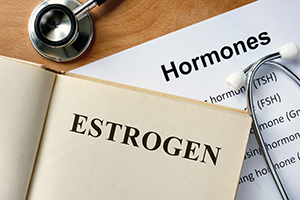
An “estrogen positive” breast cancer diagnosis was very confusing.
diagnosis, blood tests were ordered. “Estrogen Positive” my oncologist said. I was told, “This is actually a good diagnosis because 80% of women diagnosed with breast cancer have an estrogen positive marker, and it’s treatable!” she said. Yahoo! I thought.
But, back to the “estrogen positive” marker. What is that? An estrogen positive marker indicates that cancer cells may receive signals from estrogen that could promote their growth. I thought my estrogen levels were dropping, so how could it be that I had too much estrogen and how had it fueled cancer cells in my body? It wasn’t explained to me why I had too much estrogen. I was completely in the dark about how my hormones were playing into all of this. Where was the excess estrogen coming from I wondered? (See Part Two of this post next week for how we are at risk for excess estrogen in our daily environments.)
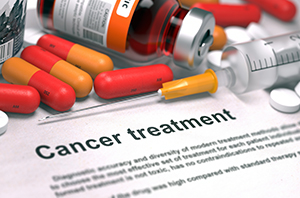
I’d like to see a future where cancer protocols involve more non toxic and alternative treatments.
Ages 48 and 49 – Being terrified with a cancer diagnosis, I put my trust in the hands of wonderful doctors and nurses and signed on for “the program” which over a nine-month period included a double-mastectomy, chemotherapy and radiation.
Following that treatment program, I was put on an anti-estrogen medication called Tamoxifen, for five years, to avoid recurrence. (Much of this same protocol is administered for women with estrogen positive diagnoses like mine.) My new mantra during that window of time became, “Keep the estrogen out of my body.” Bad estrogen!
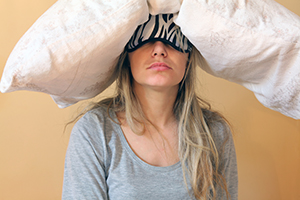
Hormone imbalances can cause insomnia at any age.
Oh yes, I must also mention that with the surgery and ensuing treatment, I went into immediate Menopause at 49. Great, it just kept getting better (sigh…). One of the major side effects of the anti-estrogen drug was insomnia. We all know how important sleep is, and here I was taking a drug that kept me awake and left me feeling exhausted. After feeling awful on this drug for 4 ½ years I went off of it at the age of 53. I decided I’d rather get my sleep than feel as bad as I did.
Forward to my early 50s – Hot flashes, more weight gain, more insomnia, and (a whole lot of crankiness. A year following my treatment, I had the good fortune to meet Dr. Erika Schwartz at a wellness retreat in New York. She is a leading national expert in the field of natural hormone therapies and disease prevention and has written five books about hormone health and anti-aging. I found her presentation on hormones illuminating. I reached out to her and, following more blood work, she got me started on thyroid medication.
I started getting some of my energy back! She also suggested I start taking bio-identical hormones. What? I had had estrogen positive cancer, (why would I do that? I politely declined, but did buy a copy of her book ,“The Hormone Solution.”
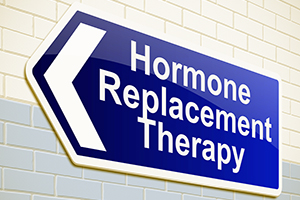
It was time to consider the options for Hormone Replacement Therapy!
In her book, Dr. Erika shares that hormones “are the juice of life.” She emphasizes that a balance of estrogen and progesterone are essential to good health, healthy heart and bones, cognitive sharpness, digestive and libido health and sleep and weight management. Hormones do all that? Who knew?
I learned that many western doctors haven’t been trained in hormone balancing and thus don’t guide women to the proper balance of progesterone along with estrogen. To be honest, I have to wonder if women were having their hormone levels checked and balanced starting in their mid to late thirties and continuing into each decade, would overall estrogen positive cancer diagnoses perhaps taper off?
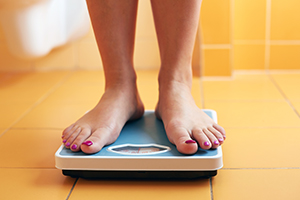
Insomnia and additional weight gain can push a woman with imbalanced hormones over the edge.
Age 55, a moment of truth – My daughter was getting married that year, I wasn’t sleeping, I was cranky, I was getting foggy and forgetful and did I mention I still wasn’t sleeping? My weight gain was not leveling off and did I mention I still wasn’t sleeping? (How I love sleep!)
Dr. Erika to the rescue! At this juncture in my life, I decided to take a leap of faith: to choose quality of life over feeling crummy. I knew that no one can guarantee how long we are here for. I could have a cancer recurrence next year, or never. I needed to feel better and I needed to trust. After reviewing my baseline hormone levels in my blood work, Dr. Erika started me off on a low dose course of bio-identical hormones in cream form. Easy! Applications of the creams once in the morning and once at night on my wrist started me off on a course that has changed my life! Weight came off, irritability left and I could finally sleep!
Of course, any decision we make regarding our health has to be based on what we feel is best for us. I have friends who have gone through life with balanced hormones; they will never need to make hormone supplementation decisions (lucky girls!). On the other hand, I’ve witnessed women who have had hormonal imbalances since they were teenagers. They take medications with crazy side effects. I do believe that hormone supplementation might have worked wonders for them.
Hormone health is a big topic with lots of significant information and for that reason I’ve broken this post into two parts. You’ve read my story and experience in this post.
Next week, I’ll be addressing these important questions:
- What is a bio-identical hormone?
- What is the difference between synthetic hormones and bio-identical hormones?
- Don’t doctors say hormone replacement can cause cancer?
- What are the health benefits to women who take bio-identical hormone replacements
- How would I find a doctor/practitioner in my area who can prescribe bio-identical hormones?
- How much do these hormones cost and will insurance pay for them?
- What causes estrogen excess in our living environments?

The anti-aging and health benefits of balanced hormones can be life changing!
Trust me when I say that one of the most eye-opening experiences of my life has been my education about hormones and the critical role they play in our overall health and disease prevention. I look forward to sharing more with you next week and hope you will glean information that may help you move forward towards a future of good health and anti-aging energy that you won’t believe.
Don’t we all deserve to feel our very best at every stage of life? Until next week….
Peace and Good Health at Every Age!
![]()
If you “Like” this post, I’d be thrilled if you’d share it.
SEP
